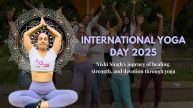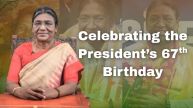By Lavanya Rathore
Born and raised in a small village in Nashik, Maharashtra, Raju Wagh’s journey from dreaming of being a truck driver to becoming a CRPF officer and finally securing AIR 871 in UPSC 2024 is a story of grit, growth, and transformation. In this Exclusive conversation with News 24, he opens up about his childhood, career transitions, life in Bastar, and the power of belief, consistency, and support systems.
Tell us about your early life and educational journey.
I am born and brought up in a village in Nashik, Maharashtra. I did my initial schooling from 1st to 4th standard there itself in the Zila Parishad school. Then I shifted to the tehsil place, where I studied up to 8th standard. From 9th class onwards, I appeared for the exam of Navodaya Vidyalaya, cleared it, and did the rest of my schooling from there. After class 12, I appeared for JEE Mains, which was called something else back then. I qualified and got admission into NIT Nagpur.
After completing engineering, I got campus placement in Coal India Limited as an Assistant Manager. I worked there for around 4-5 years. After spending more than 2 years at Coal India, I came to know about the UPSC field and Civil Services Examination. I began preparing and appeared for my first Civil Services interview in 2018. Unfortunately, I wasn’t selected in the final list. I also gave the Indian Forest Services interview but didn’t qualify.
Meanwhile, I had also appeared for the CRPF examination conducted by UPSC and cleared it. I entered the CRPF, and my first posting was in Bastar. This was life-changing for me. The training was in Gurugram, Kadarpur, but the posting was in Bastar. It was shocking mainland India looked so different.
For the first time, I saw Naxalism and Naxal villages. We established camps with a team of 150 jawans, and I was leading operations. I noticed how disconnected the tribal people were from mainstream India. We were instructed to host the Indian flag for the first time after 75 years in some areas. I saw such backwardness that many tribal women didn’t even have clothes on their bodies.
This situation was deeply painful. Slowly, we started helping first by giving them clothes, inviting them to camps, eating with them, and eventually hosting the flag with them to instill a sense of belonging. Earlier, they would run away upon seeing our uniforms, thinking “Vardi wale hain toh maarenge.” Gaining their trust took almost two years. I was posted there from 2021 to 2023.
What was your childhood dream?
As a child, based on my limited understanding, I wanted to become a truck driver. I came from a very poor family. My mother was a housewife, and my father was a primary teacher in a small tribal village.
We didn’t know much back then, but things changed when I got into Navodaya Vidyalaya. It was like a Pandora’s box it opened up new experiences. There, I met district toppers and people with an influential mindset. It changed my thinking. After 11th–12th, I decided to do engineering from IIT, though I eventually got into NIT.
NIT gave me a great platform. I interacted with students from all over India, learned new languages, and overcame my shyness. Cultural integration helped me open up. Later, while working at Coal India, I felt the job was technical and monotonous.
At that time, a doctor from my district cleared the UPSC and became a District Magistrate. I saw the respect and admiration he received, and it inspired me. Though I was an Assistant Manager at Coal India, I felt the urge to enter Civil Services. Seeing someone close succeed gave me the courage to try.
How many attempts did it take, and was it tough?
This was my 6th attempt. Yes, it was tough, especially with a job. I faced many failures. In fact, I had even stopped preparing when I joined CRPF.
In 2023, I got married. My wife was also preparing for Civil Services. Just to support her, I started preparing again. She gave the Mains but couldn’t qualify for the interview. Fortunately, I did.
Who was your biggest support system?
My parents were always there, but my sister supported me a lot before marriage, she handled everything. After marriage, my wife became my strongest support system.
Did you ever feel like giving up?
Yes, many times. The exam process itself makes you feel like giving up. But I had the constant support of my wife and family. They always said, “You do it, we’re here for you.”
If you can survive operations in danger zones like Naxal areas, you can do anything. Whatever little time I had, morning or evening I used it for preparation. When I cleared prelims, I got the confidence to go further. I took a 1.5-month leave to study for Mains, and fortunately, even my seniors supported me. That was a positive boost in my journey. I cleared prelims in 2024.
What was the most horrifying moment of your journey?
There were many. Once, during an operation, a blast occurred, and a jawan got martyred right in front of me. It was horrifying. We live with these people, walk with them, eat with them they become family. Losing someone that close stays etched in memory forever. This is one of the biggest challenges in this industry you have to put emotions aside and stay focused.
Did CRPF help in clearing UPSC?
Yes, a lot. Once, I was teaching kids in the camp when the SP sir saw me. He called the DM, who noticed and appreciated it. He sanctioned a school and brought electricity to the area. I thought, “If I were the DM, I could have done this even earlier.”
I realized education and health were dire needs in Bastar. Security forces are temporary solutions. Permanent solutions come through development and to do that, one has to be an IAS officer. That’s when I decided I must join Civil Services.
What changes would you make if posted in Bastar or a tribal area?
I would first work on health and education. Education improves the next generation, and health facilities save the current one. I’ve seen people die of diarrhea and a woman die due to labor pain. So, infrastructure especially roads, healthcare, and schools is my priority.
What is the root cause of the Naxal problem in Bastar?
The root cause is the feeling of alienation and disconnect from the mainstream. They don’t feel like they belong. We need to understand and integrate with their culture instead of imposing ours.
Policies should be made keeping their culture in mind. For instance, education should be in their local language. Officers posted there should undergo training in tribal culture. They should feel like stakeholders, not outsiders losing land or rights.
Your mantra for UPSC preparation?
Consistency. Keep a simple strategy. Even 2–3 hours a day is enough if done daily. Consistency beats hard work, smart work, and talent.
How did you prepare without coaching?
All my content was online. I made short notes columns for optional and subjective topics. These notes helped in the 2-month revision period before Mains. They’re essential.
Three books you followed religiously?
- Anthropology by Akshat Jain
- Laxmikant (for Polity)
- Standard books for Environment and Ethics
What post do you expect?
This time I may get Indian Revenue Services. But I will try again.
A day off duty how would you spend it?
I’d start with yoga and meditation for 1–2 hours, have breakfast, read, and go somewhere peaceful maybe a jungle or near water. I love peace and nature.
Quick Bites
Happy Place? Jungle or near water
Tea or Coffee? Tea
Go-to song? Songs by Kishore Kumar
Most used app? YouTube, Instagram, Twitter
Comfort food? Besan bhakri, roti, and green chili thecha
Who makes you happy? Chilling with childhood friends and CRPF batchmates
Go-to person in tough times? I do Vipassana. I listen to Shri S.N. Goenka.
Title of a book on your life? From Materialism to Spiritualism
Message to younger self? Follow your instinct
Take on recent events in 2024? It’s been a disastrous year
Most memorable moment?
In Chhattisgarh, during the biggest operation involving 20,000 jawans, I was leading a team. Mid-operation, I got many calls my UPSC result was out, and I was selected. But I stayed focused, finished the operation, and then celebrated.
Message to UPSC Aspirants
Failures are a part of life. Trust yourself. Stay consistent. Don’t repeat your mistakes learn from them and keep moving forward. Study consistently, and success will come.











